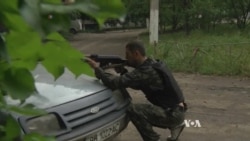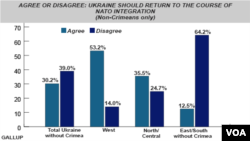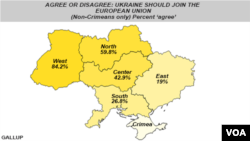LONDON —
U.S. Defense Secretary Chuck Hagel says Russia’s annexation of Crimea and involvement in eastern Ukraine are the biggest threat to European security since the end of the Cold War, and he called on NATO allies to respond.
Russian-backed militias continue to fight government forces in eastern Ukraine, challenging the country’s new government and, according to Hagel, creating a challenge for the trans-Atlantic alliance.
“We must continue to uphold the credibility of this alliance, and the credibility of the international order that European security has anchored for seven decades,” said Hagel.
Speaking after a NATO defense ministers meeting in Brussels, Hagel said the need for a new security posture will require European allies to spend more, and they should act before the alliance summit in September.
“Members should arrive at the summit already [having] taken steps in the right direction,” said Hagel.
The NATO meeting also dealt with the changing allied role in Afghanistan. The combat role will end this year, and the alliance is putting together a force to work with U.S. troops to continue supporting Afghan forces and fighting terrorism.
But it’s not so easy for European countries to agree on defense issues, according to Raoul Ruparel of the Open Europe Institute.
“The Ukraine crisis has once again highlighted the divisions within Europe, particularly on foreign policy and particularly on any form of intervention in other countries,” said Ruparel.
That has been NATO’s challenge since the fall of the Soviet Union more than 20 years ago, and it’s something alliance leaders continue to grapple with after 10 years in Afghanistan, as new and unexpected threats continue to emerge.
Russian-backed militias continue to fight government forces in eastern Ukraine, challenging the country’s new government and, according to Hagel, creating a challenge for the trans-Atlantic alliance.
“We must continue to uphold the credibility of this alliance, and the credibility of the international order that European security has anchored for seven decades,” said Hagel.
Speaking after a NATO defense ministers meeting in Brussels, Hagel said the need for a new security posture will require European allies to spend more, and they should act before the alliance summit in September.
“Members should arrive at the summit already [having] taken steps in the right direction,” said Hagel.
The NATO meeting also dealt with the changing allied role in Afghanistan. The combat role will end this year, and the alliance is putting together a force to work with U.S. troops to continue supporting Afghan forces and fighting terrorism.
But it’s not so easy for European countries to agree on defense issues, according to Raoul Ruparel of the Open Europe Institute.
“The Ukraine crisis has once again highlighted the divisions within Europe, particularly on foreign policy and particularly on any form of intervention in other countries,” said Ruparel.
That has been NATO’s challenge since the fall of the Soviet Union more than 20 years ago, and it’s something alliance leaders continue to grapple with after 10 years in Afghanistan, as new and unexpected threats continue to emerge.







